Jacqueline Berman: Easy as pie
Even on a cold day, the warm homey smell of good baking wafts down Notre-Dame St. in Montreal’s St-Henri district. That’s thanks to Jacqueline Berman, BComm 11, co-owner of Rustique Pies, which is, at heart, a country pie stand in the city. With a dozen pie offerings, plus other tasty treats, Rustique has a fervent following for their classic pies like the apple, as well as the renowned lemon meringue, and the addiction-friendly flavours like bonfire (topped with giant homemade marshmallows) and peanut butter cup.
Three years ago, Berman was invited by Ryan Bloom and Tamera Clark to join a business venture inspired by their meeting in the Cayman Islands, where he was developing real estate and she was working as a pastry chef. Berman had been working in marketing for a law firm for a year and a half, was ready for a change — and appreciates the value of dessert.
The trio decided to “pick one thing and do it well,” Berman says. The bakery offers not just traditionally sized pies but also four-inch personal size pies, mini pies and even pies-as-lollipops. Roughly a third of the business is catering for weddings and special events, and they are expanding the space to include a showroom next door. Berman points out that while Montreal boasts fabulous French pastries, there’s a dearth of homemade, American-style treats. “Everything is made here, by hand, on site, every single day,” she says of Rustique. “We peel our apples, juice our lemons. Montreal is a place that understands and appreciates that.”
Rustique exults in the local and seasonal, roasting pumpkins in fall, selling strawberry-rhubarb pie in summer. “Whenever we have access to what Quebec has to offer, we go for it!” she says.
Berman was diagnosed with celiac disease four years ago, so she offers gluten- free options, even if they can’t be advertised as such due to the possibility of cross-contamination with the regular flour dusting around the kitchen. “Our coconut macaroons are seriously the best macaroons you’ve ever eaten,” she swears, and their divine chocolate sparkle cookies are made with almond flour.
People often underestimate the amount of work and challenges that go into starting a business, says Berman, who was 25 when Rustique opened. “We didn’t anticipate how quickly things would take off,” Berman says. It was hard to keep on top of inventory, from ingredients to packaging to take-away cups. They aim to be as environmentally friendly as possible in the packaging, too, while maintaining the integrity of the product.
Despite the amount of work, Berman sees the reward. “You can learn a lot more as an entrepreneur than you would in a more traditional job,” Berman believes. “And for a lot of entrepreneurs, the harder you work, the better off you are.” Berman’s husband, David Bloom, BComm 08 (see his story below), Ryan’s brother, owns the restaurant Sumac, a few blocks away. Jacqueline met David through a third Bloom brother, Jon, who owns Tuck Shop across the street from Rustique. They all hope that the stretch of Notre-Dame St. between the two establishments becomes a walking destination for locals and tourists.
Berman credits David for fostering her passion for food. “Their mom did us wives a wonderful service by having them involved in the kitchen,” she says.
- Drop by Rustique: 4615 Notre Dame W., Montreal
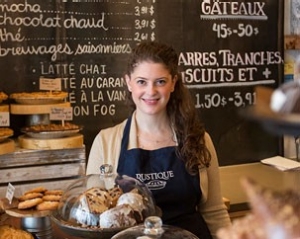 Jacqueline Berman in her Rustique Pies bakery. “Concordia gave me a good sense of small business. I really learned a lot about the value of doing research.”
Jacqueline Berman in her Rustique Pies bakery. “Concordia gave me a good sense of small business. I really learned a lot about the value of doing research.”
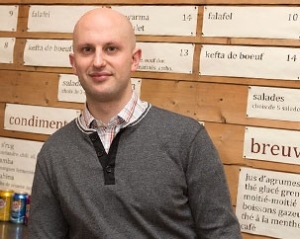 David Bloom co -owns Sumac in Montreal. Bloom says of his days at Concordia: “It was fun to be with people with a variety of backgrounds and experiences, to get to know them and build relationships with them.”
David Bloom co -owns Sumac in Montreal. Bloom says of his days at Concordia: “It was fun to be with people with a variety of backgrounds and experiences, to get to know them and build relationships with them.”
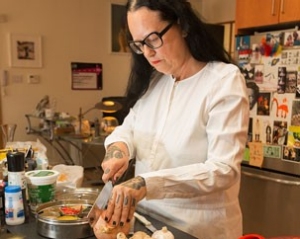 Cooking teacher Juliana España Keller started small but went bigger upon moving to her current loft-style apartment. Word of mouth and media coverage bring her clients.
Cooking teacher Juliana España Keller started small but went bigger upon moving to her current loft-style apartment. Word of mouth and media coverage bring her clients.
 Gabriel Malbogat and Robert Kauffman at their Chef on Call premises.
Gabriel Malbogat and Robert Kauffman at their Chef on Call premises.
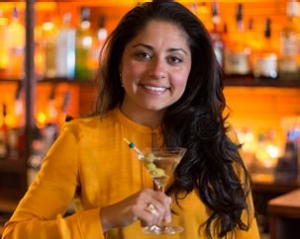 Penelope Yotis owns En Cachette Speakeasy bar in Montreal. She’s always been open to experimenting. “At the beginning, you don’t know what’s going to work. Your cocktails, everything.”
Penelope Yotis owns En Cachette Speakeasy bar in Montreal. She’s always been open to experimenting. “At the beginning, you don’t know what’s going to work. Your cocktails, everything.”
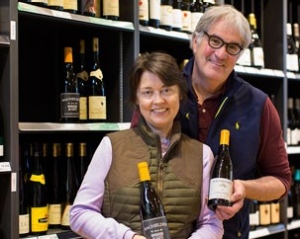 Thomas Bachelder and Mary Delaney buy grapes for their wines in Burgundy, Oregon and the Niagara Valley. “We thought we’d want to buy our own winery someday, but we like working in the three regions.”
Thomas Bachelder and Mary Delaney buy grapes for their wines in Burgundy, Oregon and the Niagara Valley. “We thought we’d want to buy our own winery someday, but we like working in the three regions.”